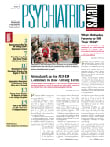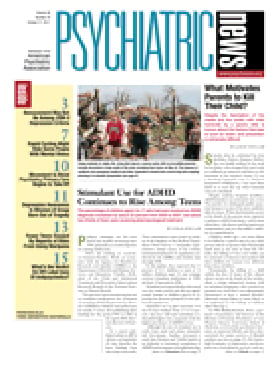The "long arm" of psychiatry is on display in this year's APA Achievement Award winners.
As in the past, this year's winners illustrate the ability of psychiatry to go beyond traditional office-based consultation and to treat hard-to-reach populations by transcending the formal settings of hospital and clinic.
The awards will be presented at the Opening Session of APA's 2011 Institute on Psychiatric Services on Thursday, October 27, in San Francisco. The awards, established in 1949, recognize national models of creative service delivery to mentally ill or disabled individuals.
The chair of the awards committee for this year's awards is Gerard Gallucci, M.D.
First-place, or Gold, awards are given to one program in each of two categories—academically or institutionally sponsored programs, and community-based programs. Silver and Bronze awards are given to programs in either academic or community settings. Cash awards will not be presented this year, as they have been in the past; administrative costs associated with the awards process were supported by a grant from Pfizer Inc.
The Gold Award winner for an academically sponsored program is the South Cove Community Health Center's "Culturally Sensitive Collaborative Treatment for Depressed Chinese Americans in Primary Care." The center is a federally funded community health center in Boston's Chinatown that predominantly serves immigrant Asian Americans. The program is funded by the National Institutes of Health and is designed to promote culturally sensitive care, including four components: systematic depression screening, outreach to those who screen positive for depression, culturally sensitive psychiatric assessment, and care management.
"Many Chinese immigrants are unfamiliar with the concept of depression, and they tend to avoid mental health services due to stigma," program director Albert Yeung, M.D., Sc.D., told Psychiatric News. "The result is that many depressed Chinese Americans remain unrecognized and untreated, and they frequently seek help at primary care. Our program aims at improving the recognition and treatment of depressed Chinese immigrants by implementing systematic depression screening at primary care and by actively contacting patients who screen positive for depression and asking them to come in for a consultation. When we make a treatment recommendation, we link it with a patient's illness beliefs and explain to the patient how he or she can benefit from the treatment."
The Gold Award winner for a community-based program is the Burke Center Mental Health Emergency Center (MHEC). Burke Center serves a 12-county rural region of eastern Texas, with a population of 370,000 dispersed over 11,000 square miles. The MHEC began operating in December 2008 as a freestanding, rural, comprehensive psychiatric emergency program in which psychiatric services are performed entirely by emergency telepsychiatrists.
Medical Director Mark Janes, M.D., explained that telemedicine has allowed the MHEC to access emergency psychiatrists on demand at any time from around the state to treat individuals facing a psychiatric crisis.
"When this program was developed, there were no psychiatric inpatient beds in the Burke Center 12-county catchment area," he said. "Patients in crisis often present to an emergency room that does not have the capability to deliver psychiatric care. They would often end up staying in the hospital for several days without psychiatric treatment until a psychiatric bed opened up somewhere. Now patients can be transferred to the MHEC, where treatment can be delivered immediately."
Silver Award Winner
The Silver Award winner for either a community-based or institutionally based program is the Statewide Telepsychiatry Initiative, a collaboration between the South Carolina Department of Mental Health and the University of South Carolina School of Medicine's Department of Neuropsychiatry and Behavioral Science. The service provides consults at 22 rural and urban emergency departments and has served some 7,150 patients since March 2009.
Codirector John Magill, who is the state director of the Department of Mental Health, noted that the program allows psychiatrists to render care in real time by assessing patients in the emergency department, accurately diagnosing and treating them with follow-up referrals to the local mental health center. "This unique project continues to improve access to care, affordability in a time of declining resources, quality of care, and timeliness of triage and addresses the shortage of psychiatrists in a rural state like South Carolina," he said.
Meera Narasimhan, M.D., codirector of the program, told Psychiatric News, "The statewide telepsychiatry project is a great community-based model for health care delivery using innovative technology and showcases how public, private, and academic institutions can work collaboratively to address the mental health needs of the state."
Bronze Award Winner
The Bronze Award winner is Johns Hopkins University Center for American Indian Health's White Mountain Apache Suicide Surveillance and Prevention System.
Novalene Goklish, senior research program coordinator for the Center for American Indian Health, told Psychiatric News that the White Mountain Apache Tribe, in Whiteriver, Ariz., experienced a spike in suicides in the 1990s. The tribe established a task force and later sought out collaboration with Johns Hopkins to develop the first tribally mandated suicide surveillance and prevention system in the United States.
All tribal members and departments are required to report self-injurious behavior to the Celebrating Life task force, including intentional self-injury such as cutting or burning, binge drinking and drug use, suicidal ideation and attempts, and deaths by suicide. Apache case managers follow up in person on every reported incident to validate the report, assess risk for future self-injury in consultation with clinically trained Johns Hopkins' personnel, and triage the individual and family members to available care.
"The program has brought a lot of awareness to the tribe, and we continue to do a great deal of community education and case management around the issue of suicide," Goklish said.

